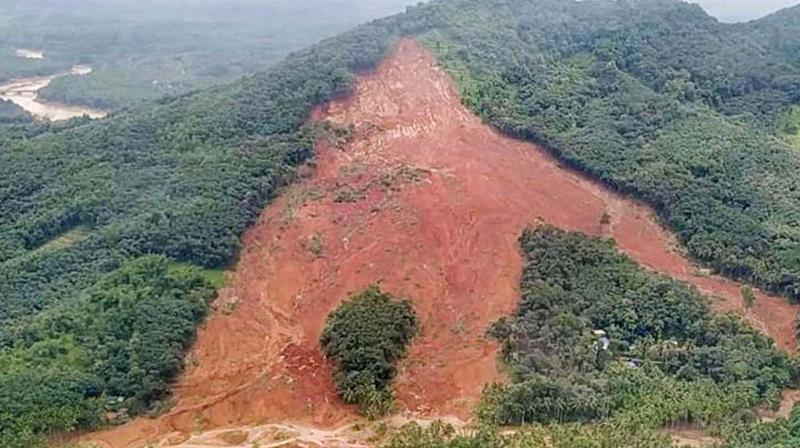Spiritual message for flood ravaged state

We have too much religion too little spirituality. Religion is what we do in temples. Spirituality illumines the life we live. Life has no labels; spirituality, likewise. So, no one would wonder that a secular newspaper accommodates spiritual insights. In its essence, secularism is a spiritual thing; at any rate, infinitely more spiritual than communalism. Spirituality is the best bulwark against the disasters of communalism that afflict us no less than natural disasters.
Merely for illustrative purpose I cite here an episode from the Bible: Jesus calming the sea. It can be read as a case study on dealing with natural disasters. I could commend, in passing, that experts and administrators of national disaster management could do better by heeding spiritual insights too, as the present instance indicates.
Jesus and his disciples face a crisis on the sea of Galilee. The sea turns violent, life-threatening causing the disciples to panic. Fear indwells man’s relationship with elemental forces: earth, air, fire, water. All of them sustain life. They destroy life as well. Natural disasters pertain to the elements.
The problem is not with the elements, but with the way we relate to them. As the sea rages and their boat faces the imminent danger of capsizing, the disciples cry out for help. First Jesus rebukes the littleness of their faith. Then he calms the sea.
Forget the miraculous aspect of this event, which could hinder its proper understanding in context. The significant thing is its spotlight on how human beings relate to the elemental world, or Nature.
‘Faith’ is, simply, a way of relating; as doubt also is. The relevant insight here is that a natural disaster is a pointer to the need for a different way of our species relating to nature. Natural disasters are, in other words, Nature’s cry to humankind for a just, caring and sustainable model of relationship. Such disasters cannot be ‘managed’ unless the required re-definitions and re-configurations are accepted and implemented.
The alternative is to have the tragedy of 2018 followed by similar devastations year after year. We are just emerging from its second edition. We tend to respond to disasters sentimentally.
Of course, we must feel for the victims. Of course, we must do all we can do mitigate their suffering. But the mightiest we do in this direction will still be inadequate in comparison to the sanity of averting disasters. The Gadgil Committee report and Kasturirangan Report are, in their practical essence, nothing but advocacies for a sensible, sustainable relationship with nature.
There is no relationship which does not require adjustments from the parties involved. A relationship in which one party exploits the other is untenable. It is a typical modern fallacy to want to enter into relationships without the willingness to accept the adjustments required.
Our present callousness to nature, treating it unilaterally as an object of human convenience and covetousness, has its roots in our education. Education from its beginning involves a process of alienation from nature. We transact education in alienation from nature; so much so, the progress in this model of education breeds progressive apathy to nature. The growing indifference, bordering at times on cruelty, to parents and elders is an aspect of this mindset.
It is tempting to discredit and dismiss this view as the angularity of an opportunistic moralist. But, if spiritual sensitivities still endure in us, we will not belittle the reciprocal relationship in which we are placed with nature.
Nature is our primeval home. It is strange that sensitive and caring stewardship of nature does not find a place in our hyped-up patriotism. Can there be a discontinuity between Bharat Mata and Mother nature? Is Bharat Mata only a spread of barren land, without trees, rivers, mountains, valleys, and man-made disaster zones? Is Bharat Mata an entity without a soul, insensitive to the mysteries of nature?
Most of us are not geologists or environmental experts. It is not necessary that we are. All of us, including the experts, are part of nature even if we choose to remain unmindful of it. It is impossible to build our homes without borrowing from Nature. Every act of building is also an act of aggression. In environmental terms, to build is to hurt.
Just as the human body can take wounds and bruises and still survive, provided they remain within an organic range, so also nature can take many an excess from us. But nature’s endurance to has its limit. This is not morality, but plain common sense. To assume that excesses shall remain unvisited by consequences is to stay deaf and blind to the logic of life and nature.
The unwillingness to accept urgently needed changes, including those that seem to limit one’s immediate benefits, creates a need to look for scapegoats. The government is one such. It may well be the case that the government is not doing enough to mitigate disasters; but the fact remains that disasters are authored by us. It is only logical that remedies must address the causes of maladies.
Natural disasters of the kind we witness today are not entirely natural. Or, if they are natural, it is because we have become anti-natural, if not unnatural.
Expecting a viable, permanent solution for these recurring human tragedies without addressing their underlying causes, is like dispensing medicines to sufferers of acute diabetes without advising lifestyle modifications.

